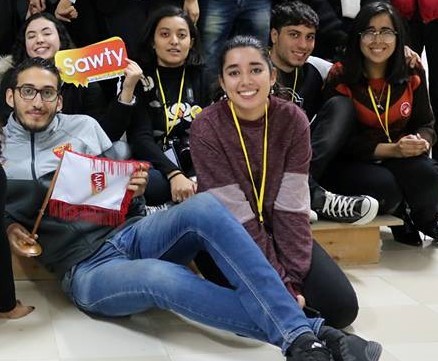
As a key bridge between citizens and decision-makers, strengthening civil society supports a citizen-oriented and citizen-driven approach to promoting democracy. To this end, IRI’s Civil Society Community of Practice is conducting a series of interviews with current and former civil society partners to highlight their work.
You can find previous interviews with partners from Laos and Tunisia on DemocracySpeaks.org.
The following is a conversation with Sara Gzara, a 19-year-old civil society activist living in Sousse, Tunisia. Gzara is an active member of Sawty Sousse and volunteers for the organization’s IRI-funded project Bus 17, which raises election awareness ahead of the May 6 municipal elections. Sawty Sousse, an IRI partner organization that focuses on youth empowerment, civic education, election awareness and government accountability, based in Sousse, Tunisia.
Name: Sara Gzara
Organization: Sawty, Sawt Chabeb Sousse
Title: Project Manager
Length of Time at Organization: Since 2016
Location: Sousse, Tunisia
Age: 19
What drew you to civil society work/ your organization?
I was interested in civil society at first because I wanted to meet more like-minded people that cared for more than just superficial things. Later, I fell in love not only with the amazing community but also with the vision as a whole. I discovered that being an active member of civil society made me understand myself and the world around me better; it made me empathize with strangers and drove me to spend hours upon hours of dedicated work to serve the values that I believed in.
What was your biggest surprise/unexpected outcome in that project?
Even after years of voluntary work, the reaction of people and their love, gratitude and appreciation still surprise me. Time upon time, people have been the highlight of projects. Funnily enough, they always start as being our biggest fear, the hardest challenge to overcome, the mission that we must get right. However, more often than not, they end up revealing the good in them much more than anticipated. This is one of the main reasons why I always come back to work in civil society because it is a constant reminder of the greatness of humanity and that our noblest achievements, our happiest memories and most worthwhile moments come from giving back.
What work have you done that you are proudest of?
Representing Sawty in a debate competition was one of my proudest achievements. I started debating about one and half years ago, fell in love with it immediately and excelled at it. My first debate competition was a regional one in Sousse last year. I represented Sawty and won “best team.” The same year, I participated in the Summer Debate Competition organized by Sawty that hosted teams from all over Tunisia and tackled topics on political and civic life, such as voting for independent candidates versus partisan, and whether major political decisions should be made by public referendum or parliament. I won “best debater” and my team was the runner up for “best debate team.” Other debate competitions I participated in tackled Brexit, tax havens, compulsory military service and compulsory voting. Representing Sawty at these debates was an honor since I believe in so much of what the association was representing, and it made me fight for a better position every time. What has also been amazing in this debating experience is the support, the responsiveness of the members of Sawty and the encouragement to participate.

What is your outlook for the future of civil society in the country?
Civil society is and should always be a priority for youth in my opinion. In Tunisia, education is considered a sacred thing and any sort of extracurricular activities are often seen as secondary and unimportant, but I believe this is one of the biggest problems in our society. The information that education offers—although mandatory for some professions—is simply insufficient and inapplicable to most situations in life. What civil society offers is a much more practical approach to things and a good practice of leadership, advocacy and communication skills that I consider to be of much higher importance than good grades. Therefore, in my opinion, civil society engagement should be a necessity in young Tunisians lives; it should be encouraged from the families, supported by the education system and an overall appreciative thing to do rather than a pastime.
What role do you think civil society should play in Tunisia?
I think civil society in Tunisia should represent hope. In a society that is constantly suffering from disappointment from the government, civil society is the reason to believe that we could improve, that we can better our community and that there still is future that is worth fighting for. I think that the image itself of civil society and its presence is the greatest indicator of a community that wants a brighter future and is fighting for it.
Top